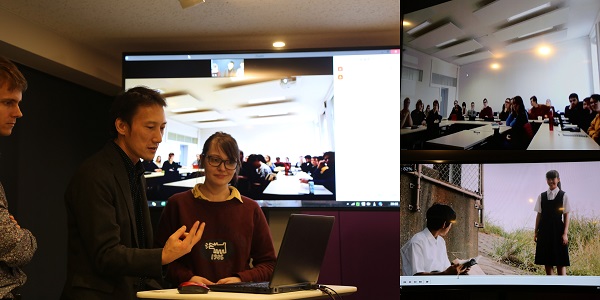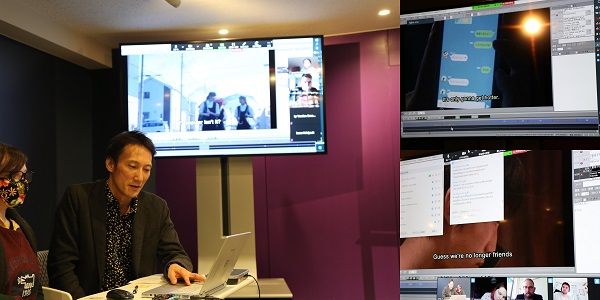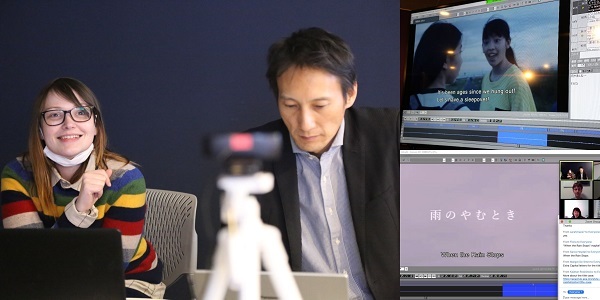第2講では、5つのグループに分かれたゲント大学の学生たちが短編映画『雨のやむとき』の日英字幕翻訳に取り組みます。
10代前半の中学生が主要な登場人物であるため、「女バス(=女子バスケットボール部)」といった、その世代ならではの言い回しや、「帰宅部」など文化の違いから、ぴったり当てはまる英語表現のない単語に悩まされた様子。
また、作中では登場人物の呼びかけにファーストネームとラストネームが使われているため、どちらかで統一した方がいいのかディスカッションが活発に行われました。「ファーストネームの方が日本語に親しみのない人にとって名前と認識しやすいのでは?」「親しい間柄であることを伝えるにはファーストネームの方がいい」といった意見も。名前の表記の仕方一つとっても、文化の違う海外の人に分かりやすい字幕を作成するには一筋縄ではいきません。最後は講師の呼びかけによって挙手で投票が行われ、まるで現地で講義が行われているかのようなライブ感のある様子も伺えました。
およそ30分の短編映画とはいっても、なかなか手強い日本語表現が盛りだくさん。学生たちは、正解がない字幕の奥深い魅力を少しずつ実感しているようです。
For the second session of the GUSP program, students at Ghent University continued their subtitle translations for the 2019 Japanese short film When the Rain Stops (Ame no yamu toki, dir. Yui Yamaguchi). With each of the five groups bringing the works-in-progress of their assigned subtitles, students shared what they found challenging as well as interesting about the translation processes.
The students’ first hurdle was finding language to reflect the characters. With a cast of mostly young teenagers, the students had to carry over the witty expressions of Japanese high schoolers and their abbreviated expressions, and ironic slang like kitakubu - for which the students coined a charming new expression “Anti-social Club.”
Another sticking point concerned what the main characters should call each other. In Japan, it’s common for young people to call each other by their family names even after becoming friends -- as was the case for the two stars of When the Rain Stops. However, students identified this as a cultural difference that needed to be addressed in the subtitles.
If Rikako and Kota weren’t on a first-name basis, would their friendship still come through? Or, for a Western audience, would family names sound too distant and formal for typical middle schoolers? On the other hand, shouldn’t their family name be preserved in the subtitles for authenticity and closeness to the original dialog?
Students engaged in a lively debate on the approaches used by each group. Ultimately, the final product needs to be consistent on character names, so the JVTA instructors took advantage of the online meeting platform to put the question to a vote.
A digital show of hands saw the class decide on using the given names “Rikako” and “Kota” in their subtitles but the discussion revealed the complex decisions that go into every translation choice. Although this short film clocks in at just under 30 minutes, GUSP students are finding it a rich opportunity to read deeply into Japanese culture and media.



